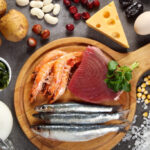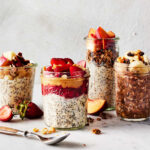Understanding what to feed your rabbit is crucial for their health and well-being. A balanced diet is essential for a happy and healthy bunny. This guide will break down the essential components of a rabbit’s diet, ensuring you provide the best nutrition for your furry friend.
Rabbits thrive on a diet that primarily consists of hay, supplemented with fresh vegetables, a limited amount of high-quality pellets, and occasional fruits as treats. Let’s delve into each of these food groups to understand What Food Do Rabbits Eat and how to properly feed them.
Hay: The Cornerstone of a Rabbit’s Diet
Hay is the most important part of a rabbit’s diet, making up about 80-90% of their daily intake. It provides essential fiber, which is critical for their digestive health and helps prevent dental problems by naturally wearing down their constantly growing teeth.
Timothy hay is widely recommended as the best option for adult rabbits due to its high fiber and lower calcium content compared to alfalfa hay. Alfalfa hay is richer in calcium and protein and is more suitable for young, growing rabbits (under 6 months old) or pregnant and nursing does. Other grass hays like orchard hay, oat hay, and meadow hay are also good choices and can be offered to add variety.
Ensure your rabbit always has unlimited access to fresh, clean hay. It should be fragrant, dust-free, and green in color, indicating good quality and nutritional value.
Fresh Vegetables: Essential Nutrients and Variety
Fresh vegetables are a vital part of a rabbit’s diet, providing essential vitamins, minerals, and hydration. A daily serving of fresh vegetables, about 10-15% of their diet, adds variety and crucial nutrients.
Daily Vegetables: These vegetables can be offered every day as part of your rabbit’s fresh food portion. A mix of 2-3 different types is ideal to provide a range of nutrients.
- Leafy Greens: Romaine lettuce, red leaf lettuce, green leaf lettuce, butter lettuce, arugula, bok choy, dandelion greens (pesticide-free), watercress, kale, spinach (in moderation).
- Other Vegetables: Bell peppers (all colors), Brussels sprouts, carrot tops, cucumber, endive, escarole, fennel, radicchio, radish tops, zucchini.
- Herbs: Basil, cilantro, dill, mint, oregano, parsley, rosemary, sage, thyme. Herbs are not only delicious for rabbits but also offer various health benefits.
These fresh herbs are safe and healthy for rabbits to eat daily, adding flavor and beneficial nutrients to their diet.
Vegetables to Feed Sparingly (1-2 times per week): Some vegetables should be given in smaller quantities and less frequently due to their higher sugar or calcium content.
- Broccoli (stems and leaves only)
- Carrots (high in sugar, offer in small amounts)
- Chard
- Clover
- Collard greens
- Flowers (pesticide-free and rabbit-safe): Calendula, chamomile, daylily, dianthus, English daisy, hibiscus, honeysuckle, marigold, nasturtium, pansy, rose.
Introduce new vegetables gradually, one at a time, and observe your rabbit for any digestive upset, such as soft stools or diarrhea. Start with small portions and increase gradually to the recommended daily amount. For adult rabbits, the general guideline is no more than 2 cups of fresh vegetables per day, while smaller breeds and rabbits under 5 pounds should receive about 1 cup.
Fruits: Occasional Sweet Treats
Fruits are high in sugar and should be offered sparingly as occasional treats, making up only about 5% or less of a rabbit’s diet. Think of fruits as dessert for your bunny, given once or twice a week in small portions.
- Safe Fruits (in moderation): Apple (no seeds), banana (small slice), berries (blueberries, blackberries, strawberries, raspberries, cranberries), cherries (no pits), grapes, melon, nectarine, orange (small segment, peel removed), papaya, peach, pear, pineapple, plum, watermelon.
The recommended serving size for fruit is about 1-2 tablespoons per 5 pounds of body weight, offered 1-2 times per week. Always remove seeds and pits from fruits before giving them to your rabbit, as these can be toxic.
These fruits are healthy treats for rabbits when given in moderation, offering sweetness and variety to their diet.
Rabbit Pellets: A Supplement, Not a Staple
High-quality rabbit pellets can supplement a rabbit’s diet, but they should not be the primary food source. Pellets are formulated to provide concentrated nutrients, but overfeeding pellets can lead to obesity and digestive issues.
Choose pellets specifically formulated for rabbits, with high fiber (at least 18%), low protein (12-14%), and low calcium (0.5-0.9%). Timothy hay-based pellets are generally preferred for adult rabbits. Limit pellet intake to about 1/4 cup per 5 pounds of body weight per day. For rabbits eating a proper diet of hay and vegetables, pellets might not even be necessary and can be completely removed from the diet.
Foods to Absolutely Avoid Feeding Your Rabbit
Certain foods are toxic or harmful to rabbits and should never be given to them. Knowing what food do rabbits eat also means understanding what they should not eat.
- Toxic Foods: Chocolate, avocado, onions, garlic, mushrooms, rhubarb leaves.
- High Sugar/Starch Foods: Human treats (cookies, crackers, chips, candy), sugary cereals, bread, pasta, potatoes, corn, beans, peas, nuts, seeds. These foods are difficult for rabbits to digest and can cause serious digestive problems like GI stasis, a potentially fatal condition.
- Iceberg Lettuce: Contains lactucarium, which can be harmful in large quantities. It also has very little nutritional value.
- Beet greens, Cabbage, Cauliflower, Mustard greens, Turnip greens: These cruciferous vegetables can cause gas in rabbits and should be avoided.
- Yogurt drops and other “treats” marketed for rabbits: Often high in sugar and unhealthy ingredients.
It is crucial to avoid feeding rabbits these prohibited foods to prevent serious health issues and ensure their well-being.
Fresh Water: Always Available
Just like any living creature, rabbits need constant access to fresh, clean water. Water is essential for hydration and overall health. Provide water in a heavy ceramic bowl, which is less likely to tip over than a water bottle and easier for rabbits to drink from naturally. Change the water daily and clean the bowl regularly with soap and water to prevent bacterial growth.
By understanding what food do rabbits eat and providing a balanced diet consisting primarily of hay, fresh vegetables, limited pellets, and occasional fruit treats, you can ensure your rabbit lives a long, healthy, and happy life. Always monitor your rabbit’s health and consult with a veterinarian experienced in rabbit care if you have any concerns about their diet or well-being.



